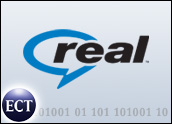
DVD duplication is going mainstream with the introduction of RealNetworks’ new RealDVD system. The software — set to go on sale for about US$30 at Real.com and Amazon.com by the end of September — lets you legally make digital copies of any disc, including all its artwork and extras. There are, however, strict limitations involved.
The move marks a fresh turn in an ongoing battle between moviemakers and technology purveyors. Unlike past utilities, however, Real insists its solution is completely legal and in line with industry standards.
Licensing Limitations
What RealDVD does is let you make a single digital copy of a disc. What it doesn’t do is let you burn extra copies to DVD or even share the digital copy with other computers — at least, not without paying extra. The program will only let you transfer the digital copy to another computer or hard drive if you purchase an additional software license for a $20 fee. Burning actual discs is never an option.
“The application is actually akin to a license — very similar to what happens with iTunes,” Chris Renk, an attorney and shareholder with Chicago-based law firm Banner and Witcoff, told TechNewsWorld. “It doesn’t give you the right to rip [the movie] onto a DVD itself,” he said.
Illegal Alternatives
The setup stands in stark contrast to the many below-the-radar solutions readily available on the Internet. Many of those have fallen victim to legal actions brought by the moviemaking industry, such as DVD X Copy — a duplicating tool whose maker was sued by the Motion Picture Association of America and forced to shut down in 2004. RealDVD differs not only by virtue of its limited use restrictions, but also because it features paid rights for the content.
“By buying the software, you’re actually paying a royalty for the use of the movies, and the rights that you get are limited by the encryption software,” Renk explained. “There shouldn’t be any real concern by the movie industry whatsoever.”
The question, then, is whether the limited functionality will be able to hold a torch to the limitless alternatives one can find online.
“I don’t think it’s necessarily going to stop people from copying DVDs illegally,” Renk predicted, “but it will provide a legal method that will be quick, relatively speaking.”
Streaming Strategy
Of course, with high-definition content becoming more and more common, basic DVD duplication may have a limited lifetime. HD-enabled streaming solutions, some speculate, may be the smarter long-term business model for tech companies to adopt.
“Probably Microsoft and Google are close enough to getting real deals with the content suppliers that they don’t want to piss them off on something like this, whereas RealNetworks has basically kind of given up on being a content supplier … and kind of has nothing to lose,” Jonathan Taplin, a clinical professor at the USC Annenberg School for Communication, told TechNewsWorld.
Right now, Taplin said, the movie industry’s restrictions make desirable streaming solutions impossible to achieve. The problem boils down to when and for how long the movies become available.
“Today, what happens is you have a [video-on-demand] release … usually after DVD,” he explained. “Then they take the rights away from them for six, nine, 12 months — so the stuff disappears while it goes into the HBO pay-TV window, which is just nonsense. You never can have a large library of on-demand content available anywhere the way you did with music,” he noted.
Rethinking that strategy, in theory, could create a high-quality alternative that would lessen consumer need for actual disc duplication — but the key would be reaching the point where it becomes feasible.
“They’re still locked in this old-fashioned windowing notion, and they’re just hurting themselves,” Taplin commented.




















































